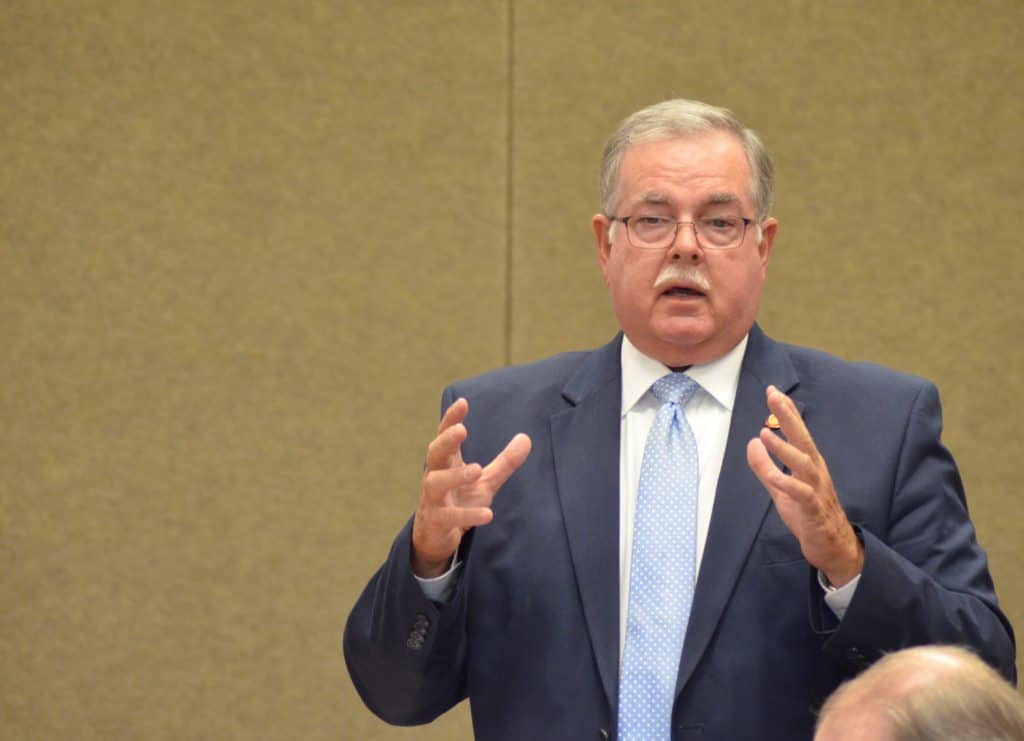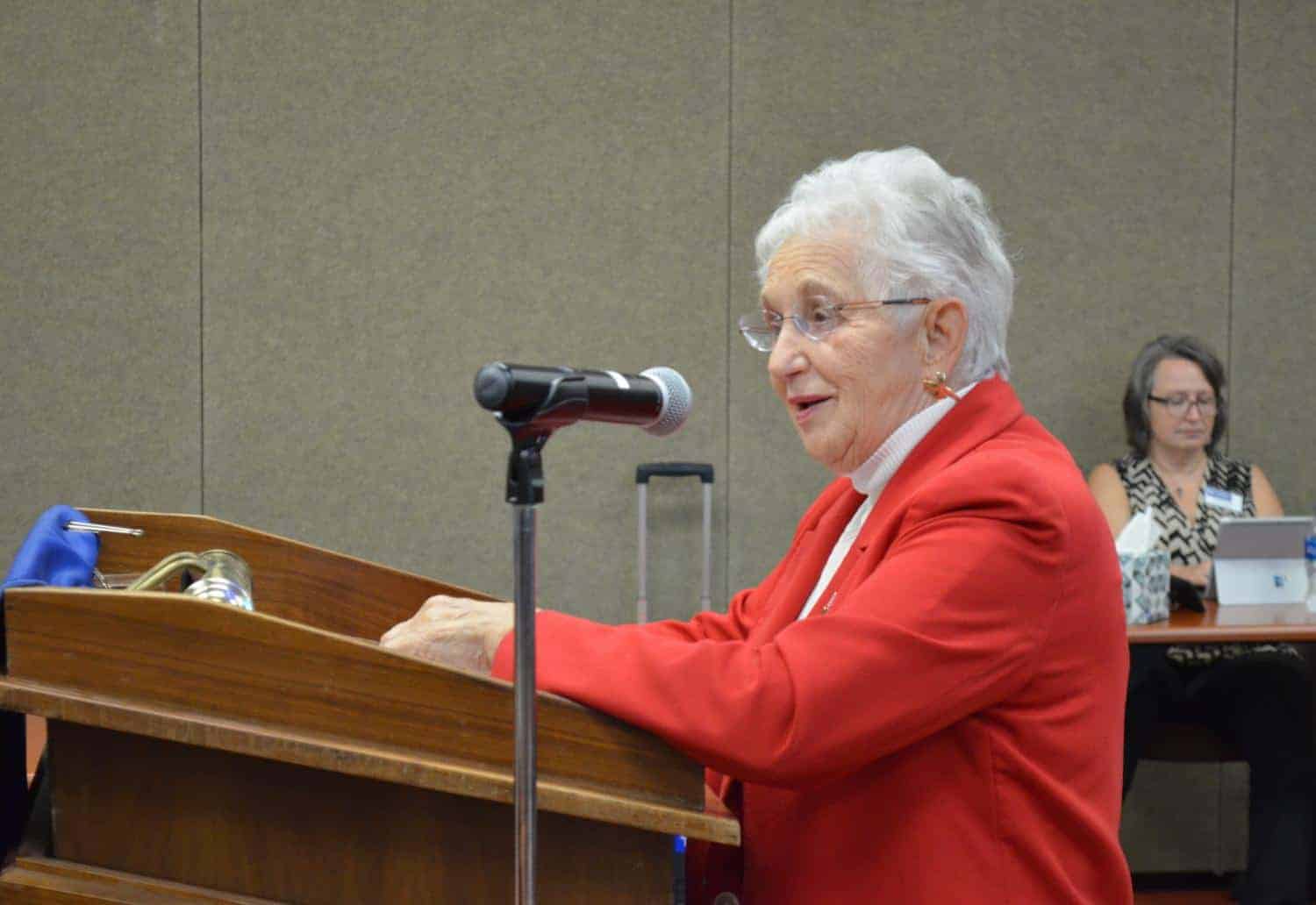United States Congresswoman Virginia Foxx told the State Board of Community Colleges Thursday that they need to be careful about the language they use. She said that the Board and others in the community college system tend to talk about “training” students, whereas four-year colleges talk about “educating” students. This has contributed to a perception that community college is a lesser form of education, she said.
“You’ve done to yourself some of that image problem through the language that you use,” she said, adding a quote she once heard from a former professor. “You train animals and you educate people.”
Foxx, a Republican, visited the Board on the campus of Forsyth Technical Community College in Winston-Salem for its monthly Board meeting, and emphasized the importance of community colleges for the future.
“While I have three degrees, I am a firm believer that we place too much emphasis on baccalaureate degrees in this country,” she said.
She said no education is wasted, so she would never dissuade anyone from getting a four-year degree, but that she thinks one of the most important avenues in education today are certifications, which are mostly obtained from community colleges.
A one-time president of Mayland Community College in North Carolina, Foxx said one of the things she focused on while working in the community college system were short-term certifications. Now that she is in Congress, she continues to focus on education as the chair of the House Committee on Education and the Workforce. She said that when she first went to Congress, she didn’t want to be on the committee at all, because she didn’t think it would accomplish much.
“Boy was I wrong,” she said, adding that the last couple of sessions have been some of the most active for education.
She mentioned the passage of the Workforce Innovation and Opportunity Act, as well as the Every Student Succeeds Act, the follow-up to No Child Left Behind. She said the emphasis in Congress has been on accountability and local control.
“We have pushed the control of decision-making down to the local and state levels,” she said.
She also took the opportunity in front of the Board to plug The PROSPER Act, which she calls the first reform of post-secondary education since 1965.
PROSPER stands for Promoting Real Opportunity, Success, and Prosperity through Education Reform, and it is a reauthorization of the Higher Education Act of 1965. The goals of the act include improving student aid, eliminating regulations, and increasing the emphasis on certifications and job-training.
Foxx said that 6.6 million jobs are going unfilled in the United States, and everybody holds some responsibility for that. The PROSPER Act aims to fix that.
“I’m firmly convinced it will make a huge difference in the lives of the American people,” she said. “Very few people are graduating from programs these days with the skills that they need to perform the jobs that are out there.”
She said she’s heard some pushback from community colleges about the accountability portions of the bill, but she said the community college system need have no fear.
“I think they can measure up extremely well,” she said.
Foxx wasn’t the only elected representative meeting with the Community College Board. State Rep. Donny Lambeth, R-Forsyth, spoke to Board members Wednesday to give them a glimpse of what they can look forward to during the long session in the spring. But he started by discussing the past short session of the General Assembly, which was controversial in part because the budget was mostly written by the time the session started, and legislative leaders presented the budget in such a way that no amendments could be made to it.


Ordinarily the budget process takes place over the course of the session and there is ample time for people outside the General Assembly to weigh in, but Lambeth said that wasn’t the case during the short session.
“We had some input, but it was panic input at the last minutes,” he said, adding that he thinks the budget process will return to normal in 2019.
He told the Board that the budget will first come out in the House during the long session, so Board members should focus on talking with House lawmakers in the lead-up to the session. He told the Board to expect capital needs to be a big focus. He said there is a need of about $2 billion to “improve and upfit” schools in the state, and that the issue will likely be resolved with some sort of bond issue.
On community college specific issues, he said that he thinks lawmakers are in support of maintaining short-term workforce funds in the long session.
“I’m pretty confident that will be a high priority for the budget writers,” he said.
He also touched on the negative perception some think community colleges have, saying that in the General Assembly, the system is viewed overwhelmingly positive.
“You rarely hear negatives,” he said.
He touched on school safety, which the General Assembly funded mostly through one-time grants in the short session, saying that lawmakers are going to try to increase the money available to over $100 million. In the short session, the General Assembly budgeted a total of $35 million for Republicans’ school safety plan.
Lambeth’s takeaway message to the Board was that Board members need to be seen by lawmakers if they want to get their issues addressed. He told them, however, to wait until after the November elections to start lobbying. Every legislator in the state is up for reelection in November, and Lambeth said the outcome could affect what happens in the long session and, thus, his predictions.
“Whatever I tell you today, don’t hold me to it,” he said.
Some expect Democrats to gain enough seats to undo the Republican’s veto-proof majority in the General Assembly. The GOP has been able to largely act without much consideration of Democratic Governor Roy Cooper’s desires since they can undo any actions he attempts to thwart. While Lambeth didn’t say definitively what he thought would happen, he did say the outcome of the elections would have an impact on decision-making in the General Assembly going forward.
“It’s quite likely that there will be many more negotiations going on in the long session,” he said.



